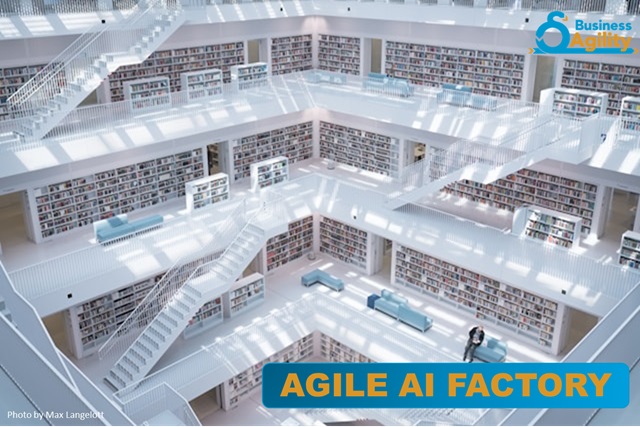ABSTRACT : Le développement dirigé de l'IA sur les modèles d'usine d'IA a un effet transformateur concomitant avec l'agilité de l'entreprise. L'impact des applications de l'IA telles que les robots-avocats et les robots-conseillers dans les domaines du marketing, de la finance, du droit, des ressources humaines, des opérations, des ventes, de l'expérience utilisateur et de la gestion. Il met en évidence l'intégration de l'IA pour des analyses marketing dynamiques, des conseils financiers rentables, une assistance juridique automatisée, des processus de recrutement rationalisés, des efficacités opérationnelles prédictives, des stratégies de vente personnalisées, des conceptions UX centrées sur l'utilisateur et des décisions de gestion éclairées.
L'avenir agile avec le modèle de l'usine d'IA : Plongée dans l'IA et les fonctions d'entreprise agiles
L'avènement du modèle AI Factory marque une ère de transformation dans les opérations commerciales, intégrant l'intelligence artificielle pour stimuler l'efficacité, l'innovation et l'agilité à travers toutes les facettes de l'organisation. Cette exploration complète permet de comprendre comment l'IA - à travers le prisme des robo-avocats, robo-advisors et autres applications avancées - redéfinit l'agilité dans les domaines du marketing, de la finance, du juridique, des RH, des opérations, des ventes, de l'UX et de la gestion, fournissant ainsi un schéma directeur pour les entreprises qui visent l'excellence à l'ère du numérique.
Marketing agile : Amélioré par l'analyse pilotée par l'IA
Le marketing agile devient profondément plus dynamique avec le modèle AI Factory, qui utilise l'IA pour obtenir des informations approfondies sur les consommateurs et ajuster les campagnes en temps réel. Par exemple, les algorithmes d'IA alimentent des plateformes telles que Google Ads, permettant aux spécialistes du marketing d'optimiser les performances des annonces grâce à des stratégies d'enchères automatisées et au ciblage de l'audience. Ce niveau de personnalisation et d'efficacité illustre la manière dont l'IA soutient le marketing agile en s'adaptant rapidement aux comportements des consommateurs et aux tendances du marché.
Finance agile : L'essor des robots-conseillers
Dans le secteur financier, l'introduction des robo-advisors représente un saut significatif vers l'agilité. Ces plateformes pilotées par l'IA offrent des conseils d'investissement personnalisés pour une fraction du coût des conseillers financiers humains, rendant ainsi la planification financière plus accessible. Des sociétés comme Betterment et Wealthfront utilisent des robo-advisors pour analyser les profils des clients, leur tolérance au risque et leurs objectifs financiers, gérant automatiquement les portefeuilles à l'aide d'algorithmes sophistiqués afin d'optimiser les rendements, incarnant ainsi l'essence même de la finance agile grâce à l'innovation technologique.
Agilité juridique : Révolutionnée par les Robo-avocats
L'agilité juridique est grandement améliorée par les robo-lawyers, des applications d'IA qui automatisent des tâches telles que l'examen de documents, la recherche juridique et même des conseils juridiques de base. Des startups comme DoNotPay démontrent le potentiel des avocats-robots en offrant une assistance juridique automatisée pour toute une série de questions, de la contestation des contraventions de stationnement à la navigation dans les tribunaux des petites créances. Cela permet non seulement d'accélérer les processus juridiques, mais aussi de démocratiser l'accès aux services juridiques, en montrant comment l'IA peut transformer les pratiques juridiques traditionnelles en écosystèmes juridiques agiles.
Agile HR : L'analyse avancée pour l'acquisition des talents
La fonction RH bénéficie considérablement de l'IA, en particulier dans l'acquisition et la gestion des talents. Les algorithmes de LinkedIn, alimentés par l'IA, affinent les correspondances entre les postes et les recommandations de candidats, rationalisant ainsi le processus de recrutement. En outre, les plateformes pilotées par l'IA peuvent renforcer l'engagement des employés grâce à des opportunités d'apprentissage et de développement personnalisées, comme le montre Watson Career Coach d'IBM, qui utilise l'IA pour guider les employés à travers des parcours de développement de carrière, favorisant ainsi une culture de l'agilité et de l'apprentissage continu.
Opérations agiles : L'analyse prédictive pour une efficacité rationalisée
L'efficacité des opérations fait un bond en avant avec la mise en œuvre de l'IA pour la maintenance prédictive et l'optimisation de la chaîne d'approvisionnement. Le modèle d'expédition anticipée d'Amazon, alimenté par l'IA, prédit les achats des clients, optimisant ainsi les processus d'inventaire et d'expédition. Cela permet non seulement de réduire les délais de livraison, mais aussi de diminuer considérablement les coûts, illustrant ainsi la manière dont l'IA facilite les opérations agiles grâce à des stratégies logistiques prédictives et adaptatives.
Vente agile : Tirer parti de l'IA pour améliorer la connaissance des clients
L'IA transforme les fonctions de vente en fournissant des informations approfondies sur le comportement des clients, ce qui permet de mettre en place des stratégies de vente personnalisées. Des outils tels que la plateforme de vente HubSpot, alimentée par l'IA, analysent les interactions avec les clients pour prédire les résultats des ventes, aidant ainsi les équipes de vente à prioriser les prospects et à adapter leurs approches. Ce niveau de personnalisation et d'efficacité est un exemple de vente agile, où les connaissances basées sur l'IA conduisent à des stratégies de vente plus efficaces et plus adaptables.
UX agile : l'utilisation de l'IA pour un retour d'information et une adaptation en temps réel
L'UX agile bénéficie énormément de l'IA, en particulier pour recueillir et analyser les commentaires des utilisateurs en temps réel. Sensei d'Adobe, un cadre d'IA et d'apprentissage automatique, alimente des outils qui automatisent les tâches de conception et optimisent les expériences des utilisateurs sur la base de données en temps réel. Cela permet un prototypage et des tests rapides, garantissant que les produits et services restent centrés sur l'utilisateur et agiles dans leur cycle de développement.
Gestion agile : L'IA au service de la prise de décision stratégique
La gestion agile est renforcée par la capacité de l'IA à fournir des informations commerciales en temps réel, ce qui permet une prise de décision rapide et éclairée. Einstein Analytics de Salesforce offre aux responsables une vue d'ensemble des performances de l'entreprise, ce qui permet des ajustements stratégiques rapides. Cela illustre la façon dont l'IA soutient la gestion agile en fournissant aux dirigeants les données et les informations nécessaires pour naviguer dans des environnements commerciaux en constante évolution.
Conclusion : Transformation de l'entreprise avec l'usine d'IA
L'intégration du modèle de l'usine d'IA dans diverses fonctions de l'entreprise annonce une nouvelle ère d'efficacité, d'innovation et d'agilité. Des robo-advisors dans la finance aux robo-avocats dans le domaine juridique, l'IA ne se contente pas d'optimiser les processus existants, mais libère également de nouvelles opportunités de croissance et de création de valeur. Cette exploration souligne l'impact transformateur de l'IA, ouvrant la voie aux organisations pour prospérer dans un environnement commercial de plus en plus numérique et agile.
Source : AI Directed-Development
Photo par Max Langelott

